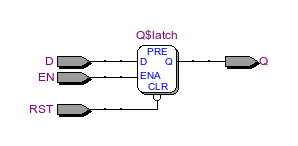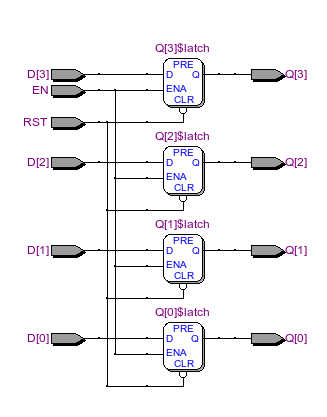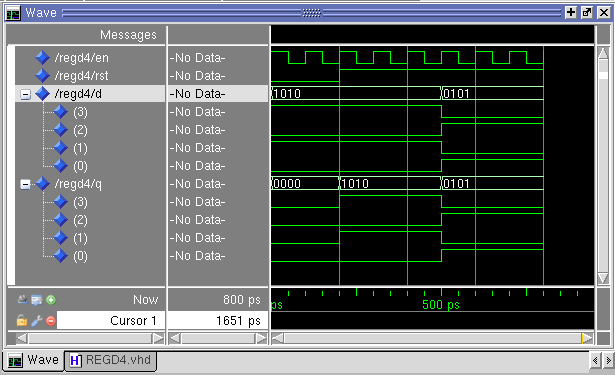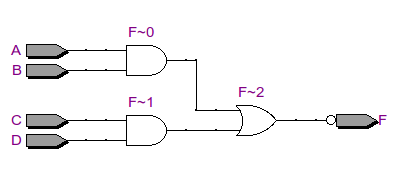Códigos VHDL para uso nas Aulas 2011-1
Descrição do hardware de uma porta E
entity PortaE is
port
(
-- Input ports
A,B : in bit;
-- Output ports
C : out bit
);
end entity PortaE;
architecture v1 of PortaE is
begin
C <= A and B;
end architecture v1;
Descrição do hardware de um Latch tipo D
O circuito descrito é ativo a entrada alto a entrada EN e ativo ao reset baixo RST
library IEEE;
use IEEE.std_logic_1164.all;
entity LAD is
port(
D, EN, RST: in std_logic;
Q: out std_logic
);
end entity LAD;
architecture v1 of LAD is
begin
process (D,EN,RST)
begin
if (RST = '0') then
Q <= '0'; -- reset ocorre quando RST=0
elsif (EN = '1') then
Q <= D; -- O valor de D passa para Q quando EN=1
-- note que a falta do uso de um else indica que nada deve ser feito caso contrário,
-- portanto o valor anterior de D permanece inalterado -> armazenamento (storage state)
end if;
end process;
end architecture v1;
Descrição do hardware de um registrador com 4 Latch tipo D
O circuito descrito é ativo a entrada alto a entrada EN e ativo ao reset baixo RST
library IEEE;
use IEEE.std_logic_1164.all;
entity REGD4 is
port(
EN, RST: in std_logic;
D: in std_logic_vector (3 downto 0);
Q: out std_logic_vector (3 downto 0)
);
end entity REG;
architecture v1 of REGD4 is
begin
process (D,EN,RST)
begin
if (RST = '0') then
Q <= "0000"; -- reset ocorre quando RST=0
elsif (EN = '1') then
Q <= D; -- O valor de D passa para Q quando EN=1
end if
end process;
end architecture v1;
Descrição do hardware de um registrador com N Latch tipo D
O circuito descrito é ativo a entrada alto a entrada EN e ativo ao reset baixo RST Note neste exemplo o poder do VHDL de parametrizar o tamanho do registrador através do generic
library IEEE;
use IEEE.std_logic_1164.all;
entity REGDN is
generic (N: integer := 4)
port(EN, RST: in std_logic;
D: in std_logic_vector (N-1 downto 0);
Q: out std_logic_vector (N-1 downto 0));
end entity REGDN ;
architecture v2 of REGDN is
begin
process (D,EN,RST)
begin
if (RST = '0') then
Q <= (others => '0'); -- reset todos os bits Q quando RST=0
elsif (EN = '1') then
Q <= D; -- passa todos os valores de D para as saídas Q correspondentes
end if;
end process;
end architecture v2;
Descrição do hardware de um Flip Flop tipo D
O circuito descrito é ativo a entrada de clk sensível a borda de subida
---------------------------------------
LIBRARY ieee;
USE ieee.std_logic_1164.all;
---------------------------------------
ENTITY DFF IS
PORT
(
d, clk, rst: IN STD_LOGIC;
q: OUT STD_LOGIC
);
END DFF;
---------------------------------------
ARCHITECTURE behavior OF DFF IS
BEGIN
PROCESS (rst, clk)
BEGIN
IF (rst='1') THEN
q <= '0';
ELSIF (clk'EVENT AND clk='1') THEN
q <= d;
END IF;
END PROCESS;
END behavior;
---------------------------------------
Implementação de uma lógica combinacional And + Ou + Inversor (Direta)
library ieee;
use ieee.std_logic_1164.all;
entity AOI is
port
(
A,B, C, D : in std_logic;
F : out std_logic
);
end AOI;
architecture v1 of AOI is
begin
F <= not((A and B) or (C and D));
end v1;
</syntaxhighlight>
architecture v2 of AOI is
signal I1, I2, I3 : std_logic;
begin
I1 <= A and B;
I2 <= C and D;
I3 <= I1 or I2;
F <= not I3;
end v2;
</syntaxhighlight>
Problema 2.1: Multiplexer
Faça um multiplexador que selecione a entrada A para sel ='01', B para sel ='10', coloque '0...0' na saída para sel ='00'e mantenha a saída em alta impedância "Z...Z" quando sel='11'.
LIBRARY ieee;
USE _________________________ ;
ENTITY mux IS
PORT ( __ , __ : ___ STD_LOGIC_VECTOR (7 DOWNTO 0);
sel : IN ____________________________ ;
___ : OUT STD_LOGIC_VECTOR (7 DOWNTO 0));
END _____ ;
ARCHITECTURE example OF _____ IS
BEGIN
PROCESS (a, b, ____ )
BEGIN
IF (sel = "00") THEN
c <= "00000000";
ELSIF (__________) THEN
c <= a;
_____ (sel = "10") THEN
c <= __;
ELSE
c <= (OTHERS => '__');
END ___ ;
END _________ ;
END _________ ;
</syntaxhighlight>
Problema 4.1: Decodificador Genérico - ativo baixo
Faça um circuito que tenha duas entradas, sel (m bits) e ena (um bit), e uma saída x (n bits). Considere que n é potência binaria de dois, e m = log2 n. Se ena = '0', então todos os bits de x devem assumir o valor alto; caso contrário (ena = '1'), o bit correspondente ao valor indicado por sel deve ser '0' enquanto que os demais bits permanecem em '1'. Use o código abaixo como base para a generalização.
LIBRARY ieee;
USE ieee.std_logic_1164.all;
ENTITY decoder IS
PORT (
ena : IN STD_LOGIC;
sel : IN STD_LOGIC_VECTOR (2 DOWNTO 0);
x : OUT STD_LOGIC_VECTOR (7 DOWNTO 0));
END decoder;
ARCHITECTURE generic_decoder OF decoder IS
BEGIN
PROCESS (ena, sel)
VARIABLE temp1 : STD_LOGIC_VECTOR (x'HIGH DOWNTO 0);
VARIABLE temp2 : INTEGER RANGE 0 TO x'HIGH;
BEGIN
temp1 := (OTHERS => '1');
temp2 := 0;
IF (ena='1') THEN
FOR i IN sel'RANGE LOOP -- sel range is 2 downto 0
IF (sel(i)='1') THEN -- Bin-to-Integer conversion
temp2:=2*temp2+1;
ELSE
temp2 := 2*temp2;
END IF;
END LOOP;
temp1(temp2):='0';
END IF;
x <= temp1;
END PROCESS;
END generic_decoder;
</syntaxhighlight>



